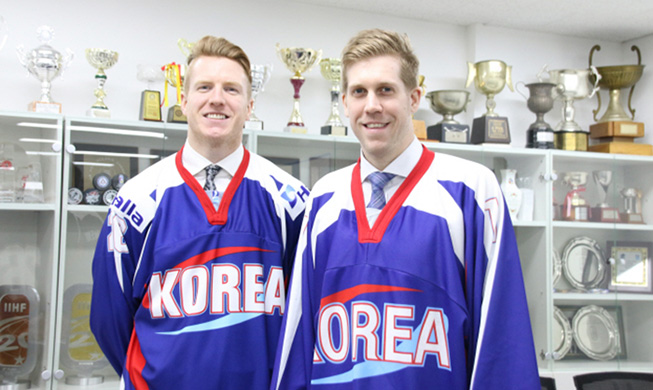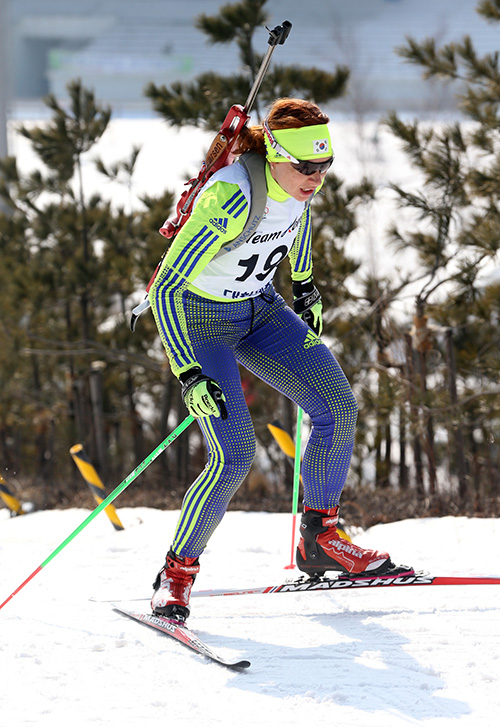View this article in another language
- 한국어
- English
- 日本語
- 中文
- العربية
- Español
- Français
- Deutsch
- Pусский
- Tiếng Việt
- Indonesian
Don't be surprised when a blond haired, blue-eyed Westerner races for South Korea at the upcoming Winter Olympics.
That's because more than 10 naturalized athletes are ready to compete under the South Korean flag when the Winter Games are staged in PyeongChang, Gangwon Province, some 180 kilometers east of Seoul, next year.
Although South Korea has produced figure skater Kim Yu-na and a slew of medal-winning short track speed skaters, winter sports have been relatively unpopular here. Especially in skiing and ice hockey, where South Korea is considered low tier, improving the country's competitiveness for the Winter Games has become an important task as local fans don't want to feel humiliated by big losses at home.
In order to have an instant boost on national teams, winter sports federations here decided to bring in foreign athletes and persuade them to play for South Korea.
In men's ice hockey, six of the 22 South Korean national team members are from North America. Canadian forward Brock Radunske first earned a South Korean passport in 2013, and fellow Canadians Brian Young and Michael Swift followed him a year later. In 2015, the U.S.-born Mike Testwuide also became a South Korean citizen.
Last year, Canadian goalie Matt Dalton and American defenseman Eric Regan joined the national team.

With head coach Jim Paek, a Seoul-born Canadian and a former Stanley Cup-winning defenseman, the men's ice hockey team has produced promising results with foreign-born players.
Last April, South Korea collected its first ever win against Japan after recording one draw and 19 losses. In November, South Korea won the Euro Ice Hockey Challenge in Budapest, Hungary.
In sledding, South Korea added German-born luger Aileen Frisch, a gold medalist at the World and European Junior Championships, as well as the overall champion at the 2012 Junior World Cup.
The 24-year-old announced her retirement after she failed to join the German national team last year, but the Korea Luge Federation reportedly approached her through Sartor Steffen, a German coach of the South Korean luge team, and asked her to race for South Korea.
In biathlon, three Russia-born athletes will race for their adopted home. Among them is Anna Frolina, who finished fourth at the 2010 Vancouver Winter Games in the women's 7.5km sprint.
The 33-year-old already delivered South Korea's first World Championship medal in biathlon, after grabbing silver at the Summer Biathlon World Championships in Estonia in August.
Frolina is joined by Ekaterina Avvakumova and Alexander Starodubets, who all obtained South Korean citizenship to compete in the PyeongChang Olympics. The Korea Biathlon Union recently said Russian biathlete Timofey Lapshin has also applied for South Korean citizenship and is waiting for the justice ministry's approval.

In figure skating, South Korea is trying to embrace two Americans for the ice dance and pair skating events at the Olympics.
Alexander Gamelin, an ice dance partner for South Korean Min Yu-ra, and Themistocles Lefttheris, a pairs partner for South Korea's Ji Min-ji, submitted their applications for fast-track naturalization to the Korean Sport & Olympic Committee (KSOC) last month, according to the Korea Skating Union (KSU).
The two teams have been skating together at International Skating Union (ISU) events since June last year.
At ISU competitions, as long as one member of a tandem is South Korean, that duo can compete under the South Korean flag. At the Olympics, however, both members of a team must be South Korean citizens to represent the country.
The KSOC, South Korea's Olympic body, has been reviewing applications from sports federations regarding foreign athletes' naturalization before handing them to the justice ministry.
Most foreign-born athletes have acquired South Korean citizenship through a special naturalization process, which is granted to foreigners with a specialized talent or skill set.
By Yonhap News
That's because more than 10 naturalized athletes are ready to compete under the South Korean flag when the Winter Games are staged in PyeongChang, Gangwon Province, some 180 kilometers east of Seoul, next year.
Although South Korea has produced figure skater Kim Yu-na and a slew of medal-winning short track speed skaters, winter sports have been relatively unpopular here. Especially in skiing and ice hockey, where South Korea is considered low tier, improving the country's competitiveness for the Winter Games has become an important task as local fans don't want to feel humiliated by big losses at home.
In order to have an instant boost on national teams, winter sports federations here decided to bring in foreign athletes and persuade them to play for South Korea.
In men's ice hockey, six of the 22 South Korean national team members are from North America. Canadian forward Brock Radunske first earned a South Korean passport in 2013, and fellow Canadians Brian Young and Michael Swift followed him a year later. In 2015, the U.S.-born Mike Testwuide also became a South Korean citizen.
Last year, Canadian goalie Matt Dalton and American defenseman Eric Regan joined the national team.

In this photo provided by the Korea Ice Hockey Association on March 31, 2016, Matt Dalton (R) and Eric Regan pose for a photo after putting on the South Korean men's ice hockey national team jersey.
With head coach Jim Paek, a Seoul-born Canadian and a former Stanley Cup-winning defenseman, the men's ice hockey team has produced promising results with foreign-born players.
Last April, South Korea collected its first ever win against Japan after recording one draw and 19 losses. In November, South Korea won the Euro Ice Hockey Challenge in Budapest, Hungary.
In sledding, South Korea added German-born luger Aileen Frisch, a gold medalist at the World and European Junior Championships, as well as the overall champion at the 2012 Junior World Cup.
The 24-year-old announced her retirement after she failed to join the German national team last year, but the Korea Luge Federation reportedly approached her through Sartor Steffen, a German coach of the South Korean luge team, and asked her to race for South Korea.
In biathlon, three Russia-born athletes will race for their adopted home. Among them is Anna Frolina, who finished fourth at the 2010 Vancouver Winter Games in the women's 7.5km sprint.
The 33-year-old already delivered South Korea's first World Championship medal in biathlon, after grabbing silver at the Summer Biathlon World Championships in Estonia in August.
Frolina is joined by Ekaterina Avvakumova and Alexander Starodubets, who all obtained South Korean citizenship to compete in the PyeongChang Olympics. The Korea Biathlon Union recently said Russian biathlete Timofey Lapshin has also applied for South Korean citizenship and is waiting for the justice ministry's approval.

In this file photo taken on Feb. 23, 2016, Anna Frolina competes in the women's 15-kilometer biathlon event at the 97th National Winter Sports Festival in PyeongChang, Gangwon Province.
In figure skating, South Korea is trying to embrace two Americans for the ice dance and pair skating events at the Olympics.
Alexander Gamelin, an ice dance partner for South Korean Min Yu-ra, and Themistocles Lefttheris, a pairs partner for South Korea's Ji Min-ji, submitted their applications for fast-track naturalization to the Korean Sport & Olympic Committee (KSOC) last month, according to the Korea Skating Union (KSU).
The two teams have been skating together at International Skating Union (ISU) events since June last year.
At ISU competitions, as long as one member of a tandem is South Korean, that duo can compete under the South Korean flag. At the Olympics, however, both members of a team must be South Korean citizens to represent the country.
The KSOC, South Korea's Olympic body, has been reviewing applications from sports federations regarding foreign athletes' naturalization before handing them to the justice ministry.
Most foreign-born athletes have acquired South Korean citizenship through a special naturalization process, which is granted to foreigners with a specialized talent or skill set.
By Yonhap News